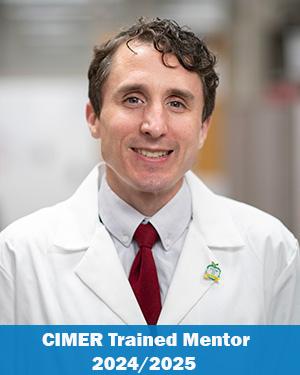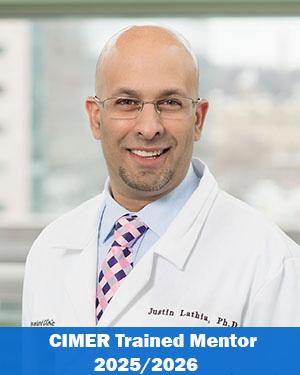Trainee Successes
10/18/2024
Molecular medicine, mentors and moving for a cure: A student’s journey
Molecular Medicine PhD student, Andras Ponti, reflects on his journey to a career in research, the role of mentorship in his success and his first VeloSano experience.

Since joining Cleveland Clinic in 2016, András Ponti has moved through the ranks from research technologist to a third year Molecular Medicine PhD Program student. A cancer survivor, he was inspired by his own experiences, as well as those of his loved ones, to pursue cancer research.
After his cancer treatment, Ponti pivoted from a planned career in physical therapy to exploring medical microbiology and epidemiology during his undergraduate education at John Carroll University.
“I was interested in helping patients recover, which is determined by the type of treatment they receive,” Ponti says. “If you can improve treatments, recovery becomes less difficult and invasive.”
With the help of Cleveland Clinic researchers, Ponti identified his research interests and found a home in the laboratories of Dr. Chris Hine and Dr. Justin Lathia, where he now works on a joint project focused on hydrogen sulfide in glioblastoma. The project earned him a $25,000 VeloSano trainee grant; he completed his first 25-mile VeloSano bike ride in September 2024.
Ponti shared his thoughts on the decision to become a Molecular Medicine PhD student, mentorship at Cleveland Clinic and what advice he’d offer to someone pursuing their PhD.
What were your first experiences with research?
My advisor and instructor at JCU, Dr. Erin Johnson, held a joint position at LRI. One project in her lab was studying alkaloids produced by poison dart frogs in Costa Rica because she suspected there were some medicinal aspects that could inhibit the growth of both gram-positive and gram-negative bacteria, as well as fungal infections. That project helped me know that I didn’t just want to focus on infection biology and the host immune response to pathogens, but I wanted to get into cancer biology.
Erin helped me decide to complete my master’s where I studied mechanisms for modulating host immune responses, a project which connected me with Dr. Christine McDonald of Inflammation & Immunity. Dr. McDonald became a part of my thesis committee and as I was finishing up, I found out she had a technologist leaving. The day after commencement, I began in her lab. I worked there for six years before I made the choice to enter the Molecular Medicine (Mol Med) PhD Program.

Tell me a little bit about your start in the Mol Med Program.
Most of my background and prior experiences were all in research, and I wanted to follow my original purpose of discovering new avenues for treating patients. All those signs pointed to pursuing a graduate degree in basic and translational science.
I’m in year three and have discovered there are few better programs for doing this than the Molecular Medicine Program at Case Western Reserve University through the Cleveland Clinic Lerner College of Medicine. A lot of the instructors are principal investigators with LRI. I completed a rotation with Drs. Justin Lathia and Chris Hine, which led me to where I am now.
What does your day-to-day look like?
I had a great experience in both Dr. Lathia and Dr. Hine’s labs, so they now co-mentor me as I work on their joint project focused on hydrogen sulfide in glioblastoma. I spend most of my time running back and forth between the labs, making the best use of the expertise provided in both settings.
We (the research community) have always been so focused on the production of hydrogen sulfide because it suppresses tumor growth in glioblastoma. Our group wanted to expand our focus and look at the breakdown and metabolism of hydrogen sulfide. We also wanted to understand how glioblastoma adapts to the presence of this gaseous molecule and gets rid of it, while also using it to escalate energy production for the purpose of increasing tumor growth.
The Molecular Medicine Program experience has been amazing. They have courses dedicated to gaining a greater clinical perspective. I shadowed two different neurosurgeons and was able to go into the operating rooms and see how they operate on both low- and high-grade gliomas. Just seeing the differences in how the tumor resides in the brain and how surgeons approach the resection was incredible.
What’s your favorite part of the job?
There’s a lot of disappointment in doing experiments. You can and will fail often. But in those moments that you see some success and can really envision the impact on patient care. It’s all worth it -- knowing you’re making some kind of impact, even if it’s an incremental step forward.

How have your mentors shaped your career?
Drs. Lathia and Hine are so supportive. There are weeks, sometimes months, where things don’t go according to plan. They assure me it’s alright and tell me to keep showing up. They recognize that not everything has to be something that goes into a paper. If you’re trying, that’s what matters.
They’ve helped me become a better scientist in terms of framing questions. I’m often the person who runs headfirst into something without planning. Working with them has helped me focus my thoughts and generate questions before jumping in.
What advice would you give to someone pursuing their PhD?
Giving yourself time between programs is vital. Experience allows you to hone your skills so that you’re more confident and capable when starting in your chosen field or program. PhD programs are a long commitment, so you get time to be sure of what you’re doing. I’d also tell them it’s important to be selective when picking a mentor. Having great mentors like I do makes the time you’re spending in the lab much more enjoyable.
Featured Experts
News Category
Related News
Research areas
Want To Support Ground-Breaking Research at Cleveland Clinic?
Discover how you can help Cleveland Clinic save lives and continue to lead the transformation of healthcare.
Give to Cleveland Clinic
